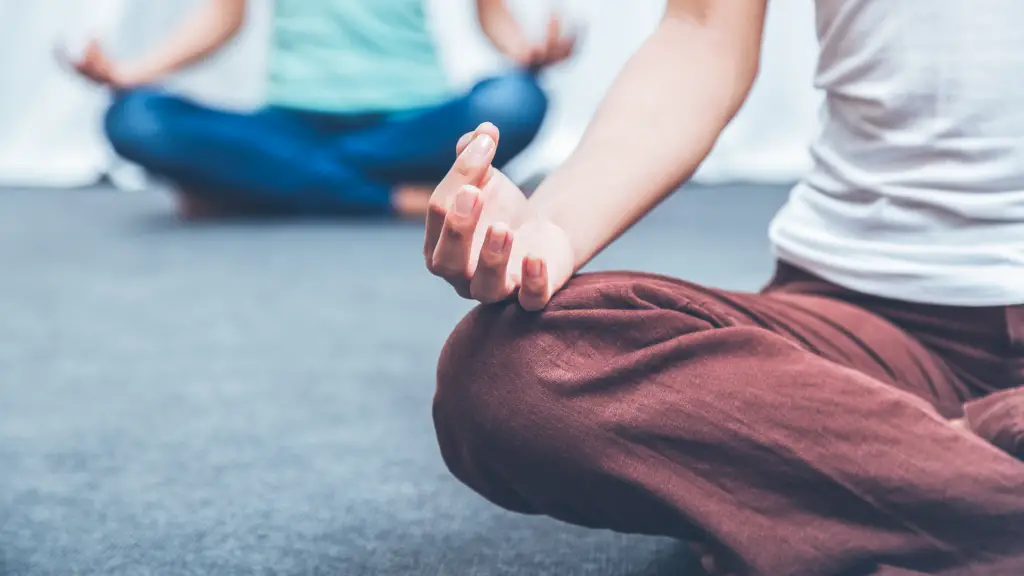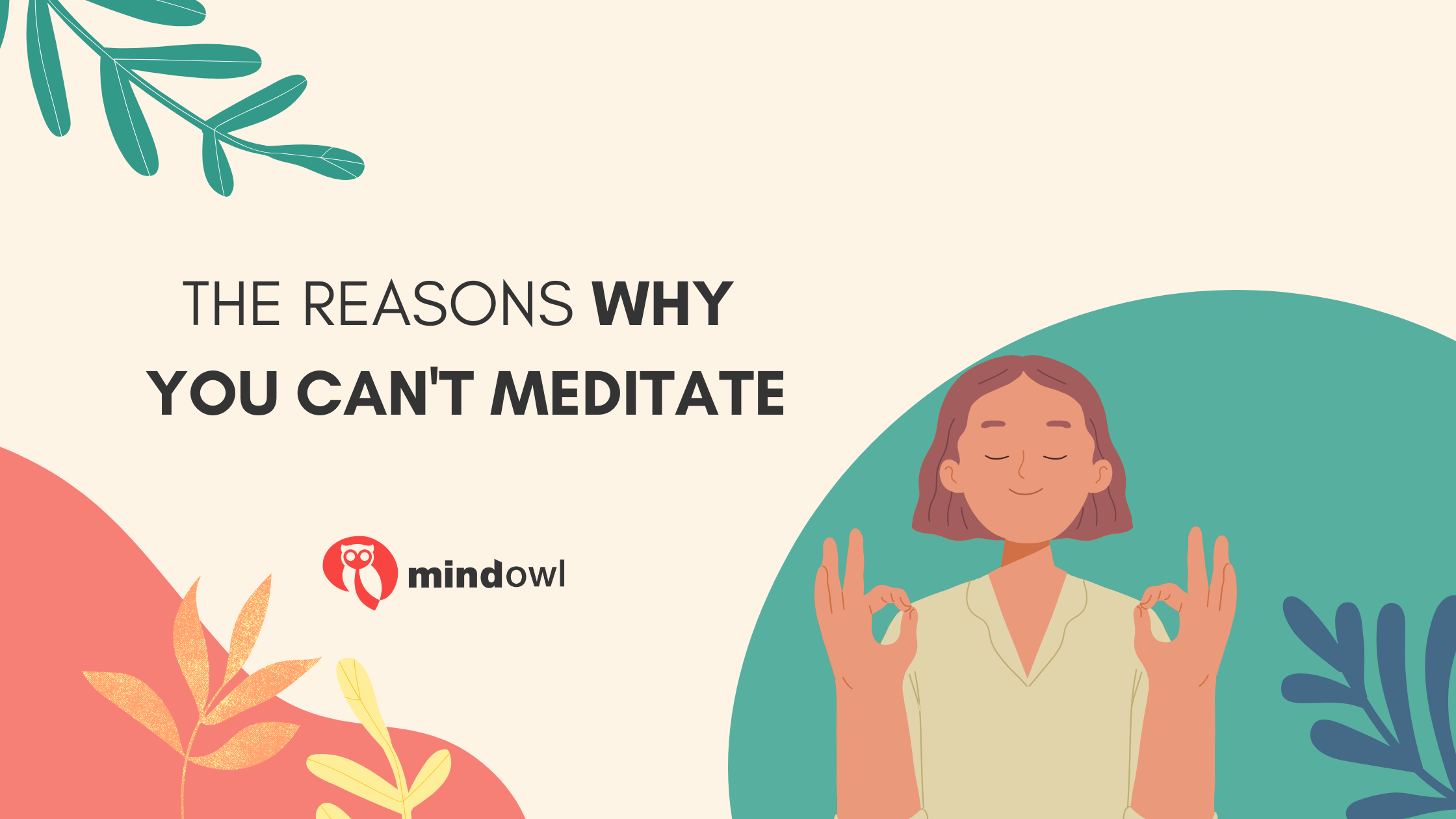We’ve all heard about the amazing benefits of meditation: it lowers stress-related symptoms, reduces anxiety, helps with depression, reduces chronic pain and it can also lower blood pressure. We’ve seen pictures of people sitting with their legs crossed and eyes closed in what appears to be an effortlessly tranquil experience and thought how easily we could achieve this ourselves.
But when we try meditation, it feels like we are experiencing even more thoughts than normal. Instead of tuning into our thoughts and emotions, we feel even more stressed out and frustrated with the whole thing.
No wonder so many of us believe we’re the only ones who can’t meditate. When in reality, we’re just being mis-sold meditation, which in turn sets unrealistic goals in our minds of what we should experience when starting out on a journey to discover meditation.
If you want to stop feeling frustrated with your meditation practice read on to find out how.
Why do some people find meditation difficult?
I had my first experience with meditation when I was around 11 years, that’s more than 20 years ago. It was when my father joined a local Buddhist group. He would try to teach me how to meditate, but I was just thinking of nice things while believing that what I was doing was meditation. Then I had some really difficult periods in my life, many episodes of Depression and Anxiety, so I decided to give meditation a try. Although it helped me, it wasn’t life-changing as some people reported. So I decided then to do my own research on the topic to see why I wasn’t experiencing what so many others claim to have felt during meditation.
From my research, I found 4 main obstacles facing people when they begin to meditate and what you can do to overcome these and have a good meditation experience.
Let’s go through them.

But when we try meditation, it feels like we are experiencing even more thoughts than normal.
Reason 1 – You haven’t found your meditation fit
Most people believe that meditation refers to one practice, but in reality, there are hundreds of different ways to meditate. Meditation has been part of many different cultures in the past, and every new culture or person who got in touch with a meditation technique made a change to suit their personality and style. In the same way that we have different personalities, values, beliefs, tastes; there will always be a meditation practice that is more suitable to your unique way of being in the world.
Take mindfulness for example, which is probably the most popular meditation technique nowadays. Mindfulness is based on a Buddhist meditation practise called Vipassana that is popular in Thailand, Sri Lanka and Myanmar. But even in Buddhism, there are those who disagree that Vipassana is the most effective meditation practice. Meditation is not a one size fits all approach.
As I said there are hundreds of different meditations! So if you’re struggling to see results with your current practice, try as many as you can – you might even need to develop your own unique style of meditation.
Reason 2 – You’re trying too hard
Let’s imagine, you decided to give meditation a try. You start focusing on your breath, clearing your mind of all thoughts, and then your mind comes up with a plan for dinner. You say to yourself I need to come back to the breath. Then you do it again, and again, every time making more and more effort to stay focused. Eventually, you become too frustrated that it’s not working and you just give up.
If you’ve ever experienced this don’t worry, we have way less control over our minds than we think we do. In psychology, we have the white polar bear experiment which demonstrates this perfectly. Let’s try it quickly now. I’ll ask you not to think of a white polar bear. Yes, really try it. Are you succeeding? No? Try again. Try harder. Now don’t think of an ice cream. Try it. Really try it. How was it?
This exercise demonstrates that if you’re struggling to maintain focus during meditation, simply trying harder to keep your mind blank won’t work. If you notice that your meditation is becoming too effortful, back off a little bit. Do some breathing exercises, and see if you can just notice what’s happening in the present moment without giving any instruction to your mind. We often see that the most meaningful moments of meditation happen when we let go of control, and surrender to a different form of intelligence that doesn’t need the analytical side of our mind. If this sounds familiar to you, it may also be worth considering that concentration-based meditation techniques might not be the best style for you to start with.

Reason 3 – You’re having a “dry meditation” session
Most people spend 95% of their lives in a busy state of mind. Our minds are always thinking of things, making plans, rehearsing what needs to be done, or worrying about a future that hasn’t, and will probably never happen. And then we decide, “I need to calm myself down, let’s meditate for 10 minutes”. It’s not going to work, is it? We’ve tried to switch from a panicked and stressed mind to a peaceful and calm mind instantly. So here you can try two things.
The first one is to have a warm-up before you try to meditate. Try, for example, implementing a ritual in which you practice some slow deep breathing for ten minutes, or you can try some positive psychology exercises like when you remember 3 good things that you are grateful for in your life. This way you’ll be priming your brain for the practice of meditation. Then the second suggestion is to reduce the division between meditation and your life. A way of doing this would be to take 5 minutes every hour to have a mindful moment where you slow your breath down, be mindful of what’s happening around you and in your body.

Reason 4 – You expect to see results overnight
The way meditation is being sold today, especially by meditation apps, makes most of us believe that our minds can be transformed in just 10 minutes. But you don’t expect to enrol in a gym and be fit in one day. It shouldn’t be any different when it comes to meditation. It takes time to see the results. Using the same analogy of going to the gym or practising some physical exercise, if you’ve been inactive for a while and decide to start exercising you know that the first 2 weeks will be really difficult, but then you start seeing a small difference and that will keep you motivated to keep exercising.
The same applies to meditation. Once you find a method that works for you and you invest in a couple of weeks of practice, things will get better. It’s important to note that the results won’t necessarily be seen in your meditation session but in your daily life. Are you feeling a bit more focused? Less snappy? Also, expect that the first 5-10 minutes of your meditation won’t be the most productive, it takes a while for your mind to switch to a new mental mode. The more you are able to stay in meditation, the more you can see this shift occurring. You’re moving out of this analytical side of your mind to a more calm way of being aware.
Why you can’t meditate – conclusion
If you are struggling to meditate and find yourself despairing over your perceived failures while others seem to take to it so naturally, hopefully, you can take away from this article that you are not alone. Meditation can be difficult, in fact, it promises to be difficult. Mastering your mind, and quite often going against your minds natural instincts can be challenging. But it is only with perseverance that you will reap the benefits of a meditation practice. It’s always good to take some time to learn about the mind and what to expect when practising meditation; keeping your expectations realistic will help you to not feel disappointed when your mind wanders 99% of the time. It’s also important to mention that even though the obstacles mentioned above are very common, they might not be the only problems you face when trying to meditate.
Even if you’re grappling with a problem that has gone unmentioned in this article, it does not mean that you’re the only one experiencing it. Mindfulness teaches us to observe without judgement, and that’s the most important intention you can put towards meditation. No matter what problems you are facing in your quest to establish a meditation routine, the most essential element to your success is this attitude of acceptance and non-judgement. By doing this, and following the more specific advice laid out within this article, you’ll never have those unproductive “I can’t meditate” thoughts again.
MindOwl Founder – My own struggles in life have led me to this path of understanding the human condition. I graduated with a bachelor’s degree in philosophy before completing a master’s degree in psychology at Regent’s University London. I then completed a postgraduate diploma in philosophical counselling before being trained in ACT (Acceptance and commitment therapy).
I’ve spent the last eight years studying the encounter of meditative practices with modern psychology.

